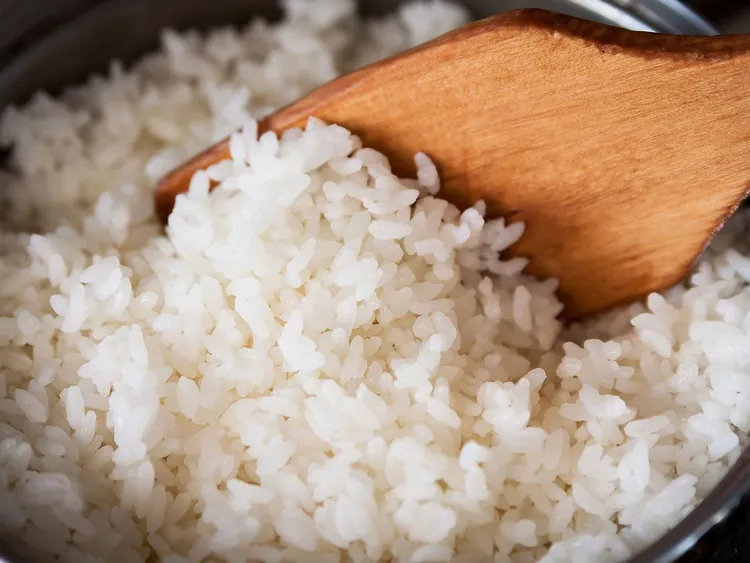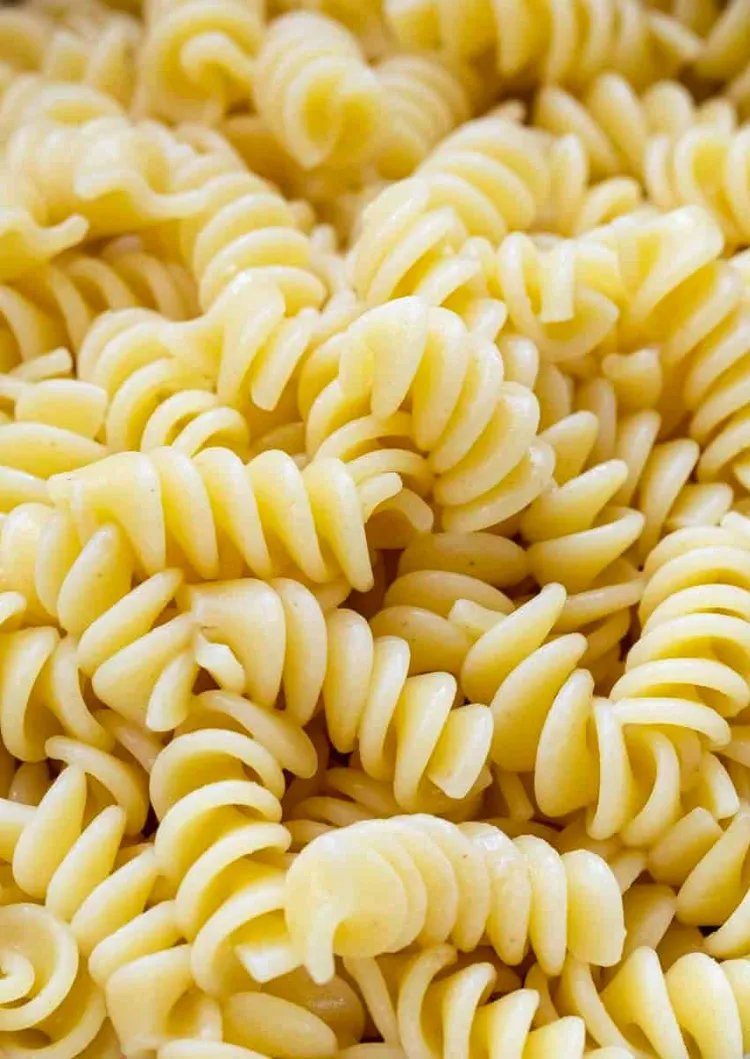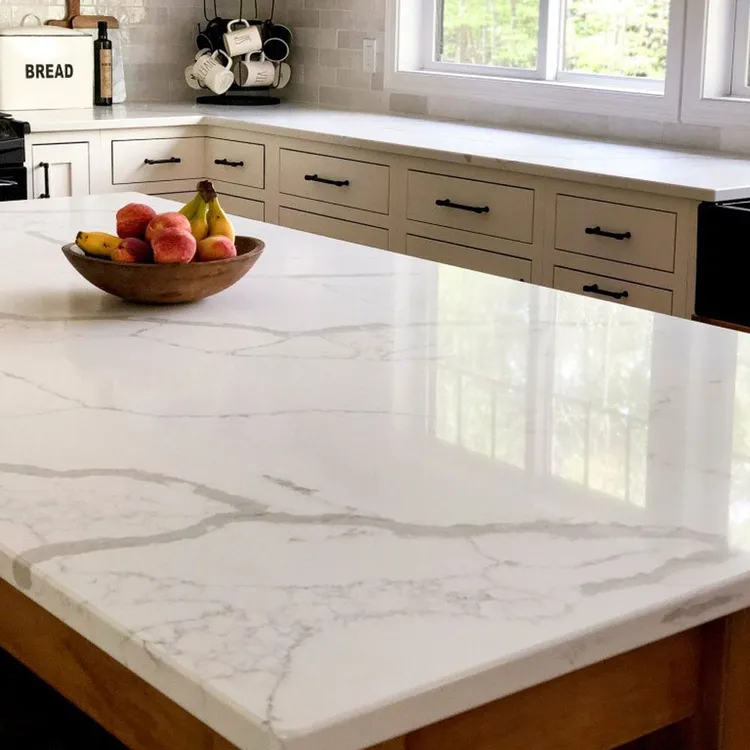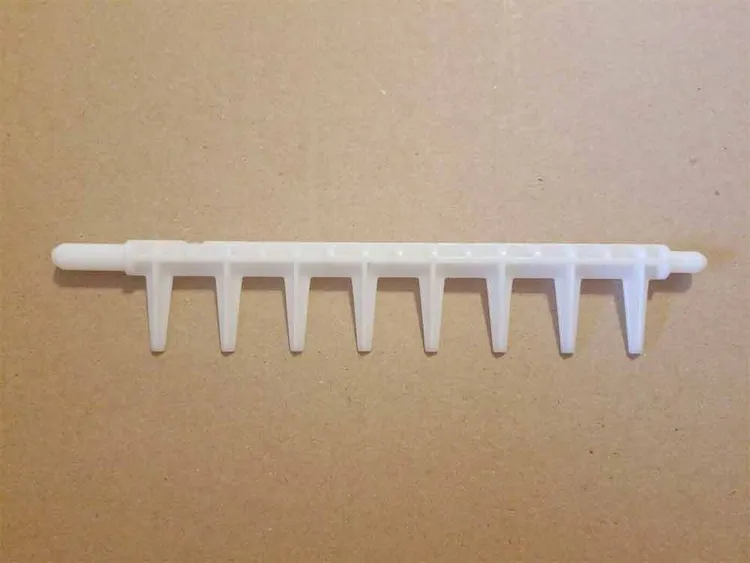Our recommendations are made independently through Research & Testing. We may receive commissions from purchases made via our links.
How to Clean Quartz Countertops
Learning how to clean quartz countertops with our methods will not only save you time but also the repair cost of a damaged surface.
Quartz countertops are dense and non-porous, virtually preventing any unwanted inhabitants like harmful bacteria or microorganisms that can lead to odors and stains. As such, once you know how to clean quartz countertops properly, cleaning alone will remove most virus particles and residues from the surface, even when there are stubborn, dried-on spills.
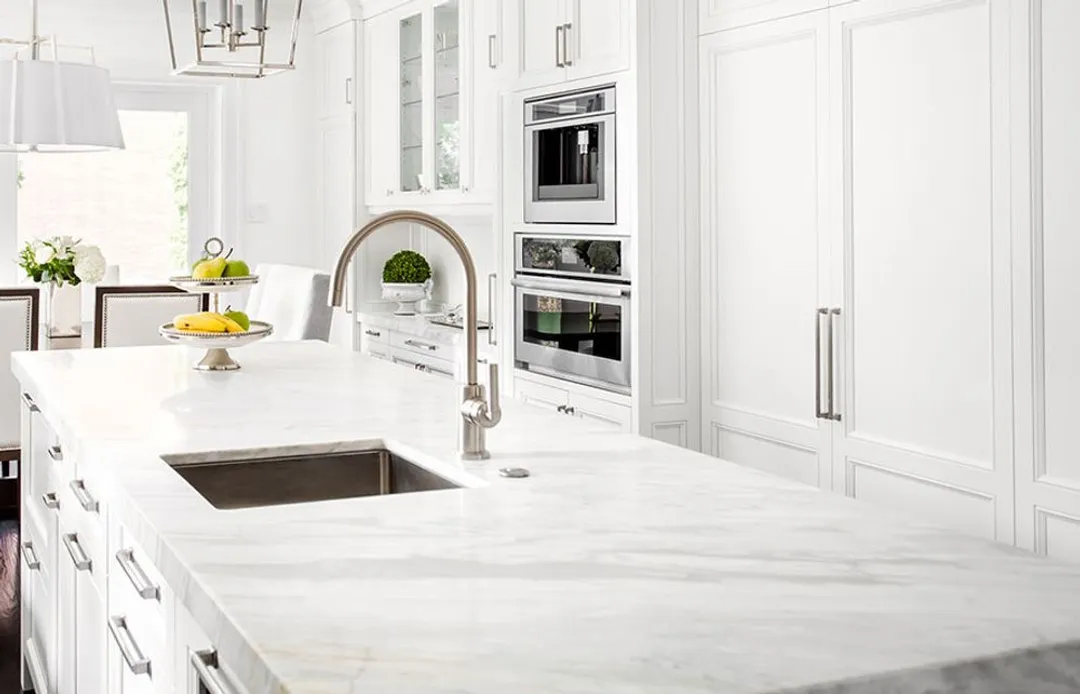
However, if your countertop is consistently exposed to raw meat or used as a cutting board, it’s advisable to additionally disinfect it to reduce the risk of foodborne illnesses. Also, should someone at your home be sick or positive for COVID-19, disinfection is highly recommended to protect you and your family from deadly germs.
Most quartz countertops are not particularly difficult to clean and disinfect, but improper use of cleaning supplies or methods could result in damaged surfaces. To prevent this possibility, we recommend you follow our step-by-step guides with some valuable tips below.
How to Clean Quartz Countertops: A Complete Guide
Cleaning with Soapy Water
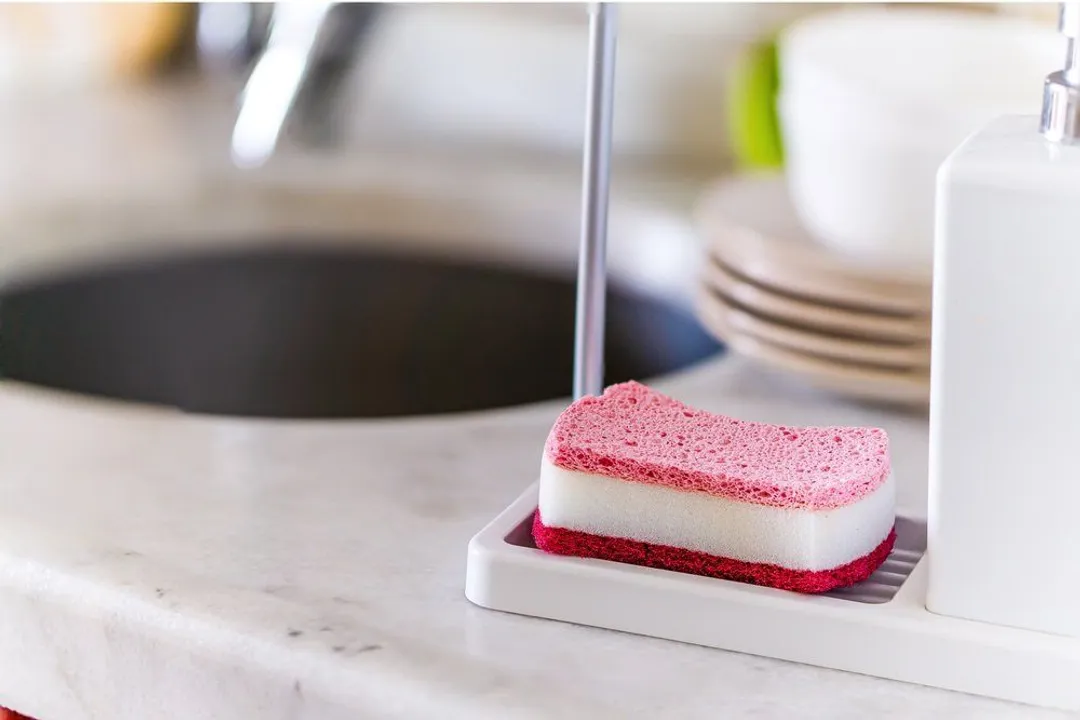
What You’ll Need
- Warm water
- Dish soap
- A cloth or sponge or paper towels
- Degreaser spray
Step 1: Dampen a Cloth with Soapy Water
Dip a soft cloth or sponge in a mixture of dish soap and warm water.
Step 2: Rub off Residue
Firmly wipe down the quartz tops to remove soils and stains. Repeat the process if necessary.
Step 3: Wipe Off Built-Up Grease
Spray degreasing agent over the countertop and immediately rinse it off well with a wet, clean cloth.
It’s recommended to apply only degreasers that are made particularly for quartz counters. Any cleaning spray involving bleach may cause discoloration, impairing the surface’s shiny finish. If you are unsure whether the chosen degreaser is compatible with your quartz surface, it’s best to ask the countertop supplier or read the degreasing agent label before cleaning.
Step 4: Dry Off the Surface
Buff the surface’s appearance with a dry, clean cloth or paper towels. Make sure it is thoroughly dry before being used again.
Cleaning with Cleanser
Most of the time, the non-porous surface of quartz countertops allows you to easily remove stains using just soapy water. But for stubborn dried-on stains, you will need some adhesive remover.
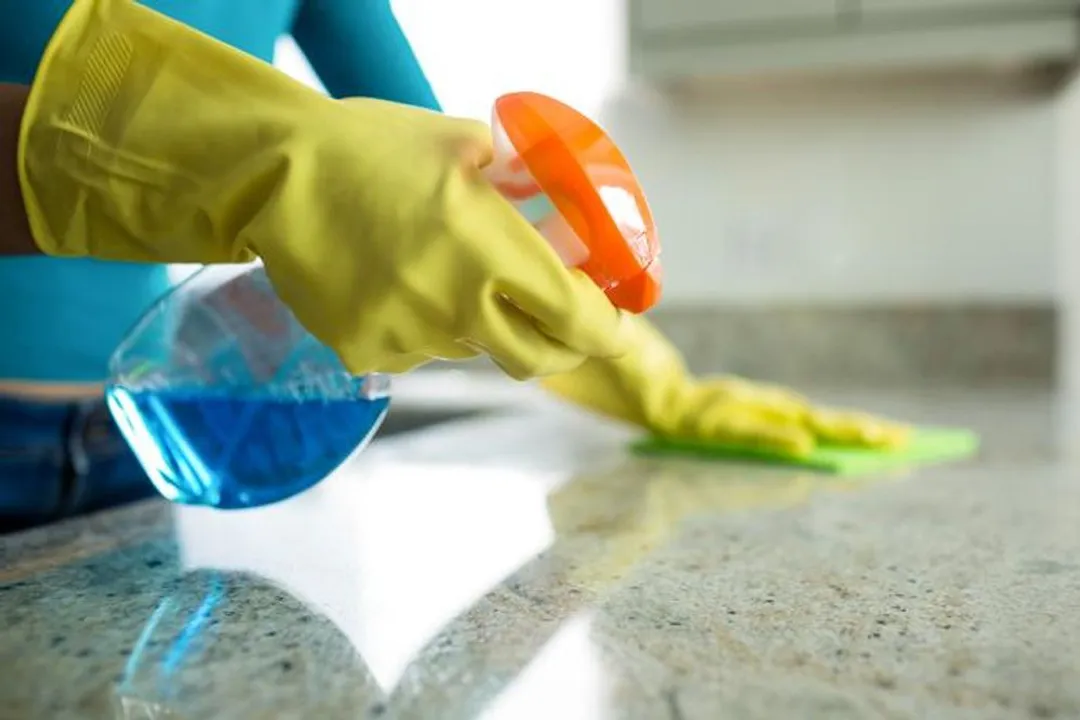
What You’ll Need
- A cloth or paper towels
- Non-abrasive cleanser of your choice
- Warm water
Step 1: Wipe away Tough Stains
Cover the stains with your cleaning solution and wait for at least 5 minutes before you use a wet cloth to clean the surface.
Step 2: Get Rid of Remaining Cleaning Solution Residue
Wipe the counter one more time with a cloth dampened in warm water to make sure all cleaning agents are removed. .
After this step, if all the stains have been removed, finish the cleaning process by drying the top with a dry cloth or paper towels. If not, continue the process.
Step 3: Apply Isopropyl Rubbing Alcohol to the Tough Stains
Use a damp soft alcohol-soaked cloth to rub off the stains. The strong disinfecting powers of alcohol should remove tough stains quickly without leaving any residue or watermarks behind.
Should you not have isopropyl rubbing alcohol handy, we recommend you use a blade scraper or putty knife to scrape off any dried-on stains instead. To avoid scratches and lacerations, take extreme caution when you are removing any excess buildup.
Step 4: Buff Dry the Countertop
Dry the surface well with a dry clean cloth or paper towels.
How to Prevent the Quartz Countertop from Damage
1. Quickly Respond to Any Spills
Although outstanding cleanability and stain resistance are notable features of quartz countertops, some staining substances, like tea, coffee, and tomato sauce, may sit permanently on the surface if left for an extended period. This is why you should deal with any stains as soon as they happen.
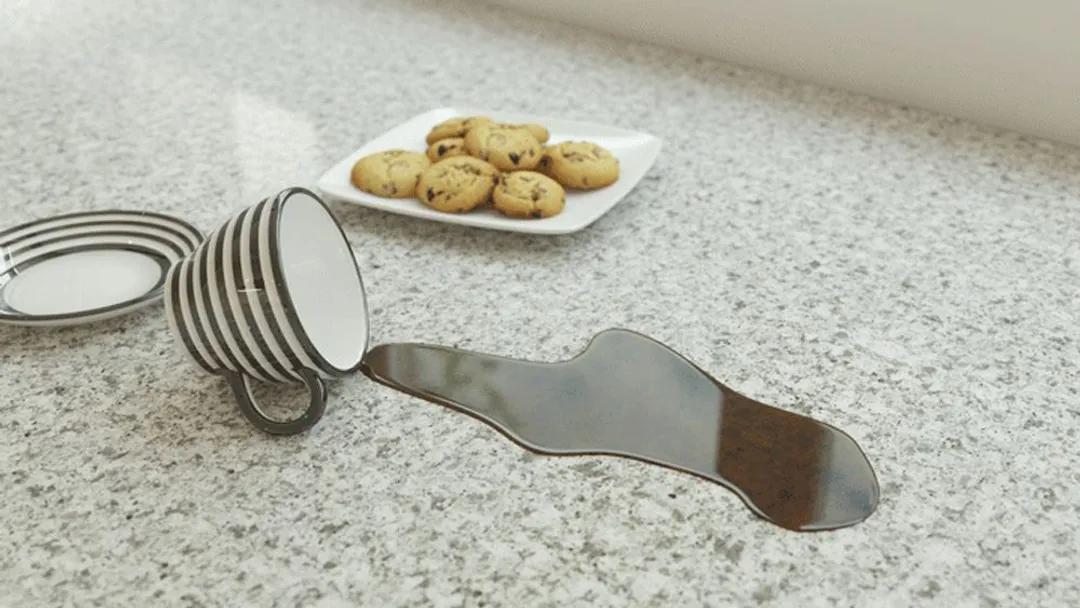
Well has it been said that prevention is better than cure. So if your quartz countertop sees a lot of coffee mugs, we recommend using non-slip drink coasters to protect the surface from scratches or stains.
2. Protect the Quartz Surface from High Temperatures
Causes of damaged quartz countertops also include high heat exposure. As an engineered stone, quartz countertops are not made up of 100% natural quartz material.
Instead, they comprise a compound of pigments and polymer resin that cannot withstand temperatures above 150 degrees. This means that placing any hot object on the surface can lead to burn marks and scorching unless you use a heat-resistant mat.
3. Avoid Harsh Chemicals Exposure
Avoid applying harsh chemicals and solvents like tarnish, oil soap, paint removers, and furniture strippers to your quartz top. Neither are any cleansers containing bleach recommended for cleaning. Such substances may increase the risk of permanent discoloration if not cleaned immediately.
4. Never Use a Quartz Top as a Cutting Board
You’d think that maybe the smooth, scratch-resistant surface of a quartz countertop is an ideal place for food preparation, but it’s actually the opposite. Even though this man-made stone is resistant to staining, strong odors, and moisture-based cracking, you shouldn’t use it as a substitute cutting board.
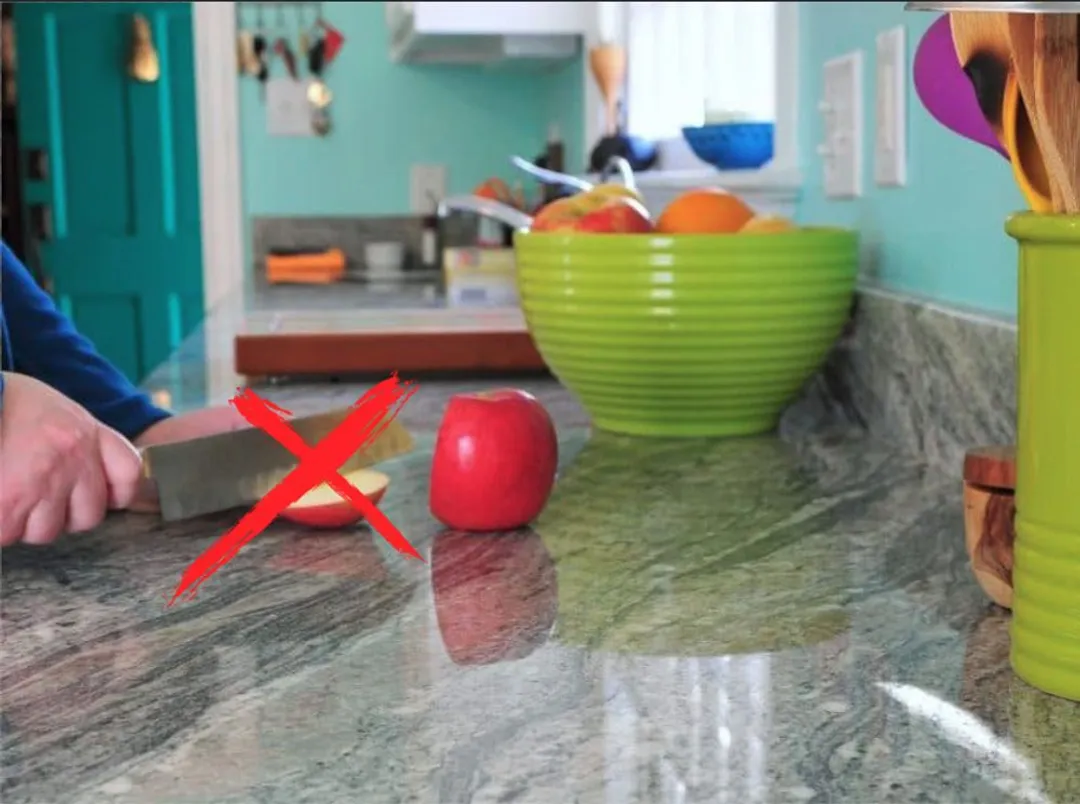
While its hardness will make it resistant to being cut or marked by your knives, it may dull the knife’s edges faster than you’d expect. Plus, if you cut or chop any ingredients directly on the quartz top without thoroughly cleaning it between each food item, cross-contamination may occur, causing possible food-borne illnesses.
How to Disinfect the Quartz Countertop Against COVID-19
Countertops are likely the most touched surface in any home, so the importance of thorough cleaning and deep disinfection shouldn’t be underestimated if you or your family members are diagnosed with Coronavirus.
Disinfection When Someone has COVID-19
A word of caution: As some disinfectants can cause an asthma attack, any person with this illness shouldn’t carry out the disinfection process unless they follow these special recommendations.
What You’ll Need
- A mask
- A pair of gloves
- A recommended quartz countertop disinfectant product
- A soft cloth or paper towels
- Warm water
- Dish soap
Step 1: Deep Cleaning the Countertop
Remove any food crumbs, and clean your visibly dirty surface with a soft cloth dampened in a soap mix or detergent. You can skip this step if your disinfectant already contains a cleaning agent.
Should you not be sure about the disinfectant’s ingredients, it’s best to check its label to verify. Also, to reduce the spread of the COVID-19 virus, don’t forget to wear a mask and gloves while cleaning, whether you’re fully vaccinated or not. Learn how to properly wear protective equipment here.
Step 2: Remove Coronavirus or any Bacterial Presence from the Surface
Apply the disinfectant to the whole surface. Some products need a certain period of exposure before being rinsed clean, while others can still ensure good results without this requirement. To verify, consider checking the “contact time” section on the product’s label.
Before starting, make sure your chemical liquid is recommended for hard non-porous surfaces while having been tested effectively against COVID-19. Also be aware that bleach solutions should not be used as an alternative to disinfectants as they could lead to surface abrasion. If you don’t have any safe disinfectants handy, we recommend choosing one from the EPA List N.
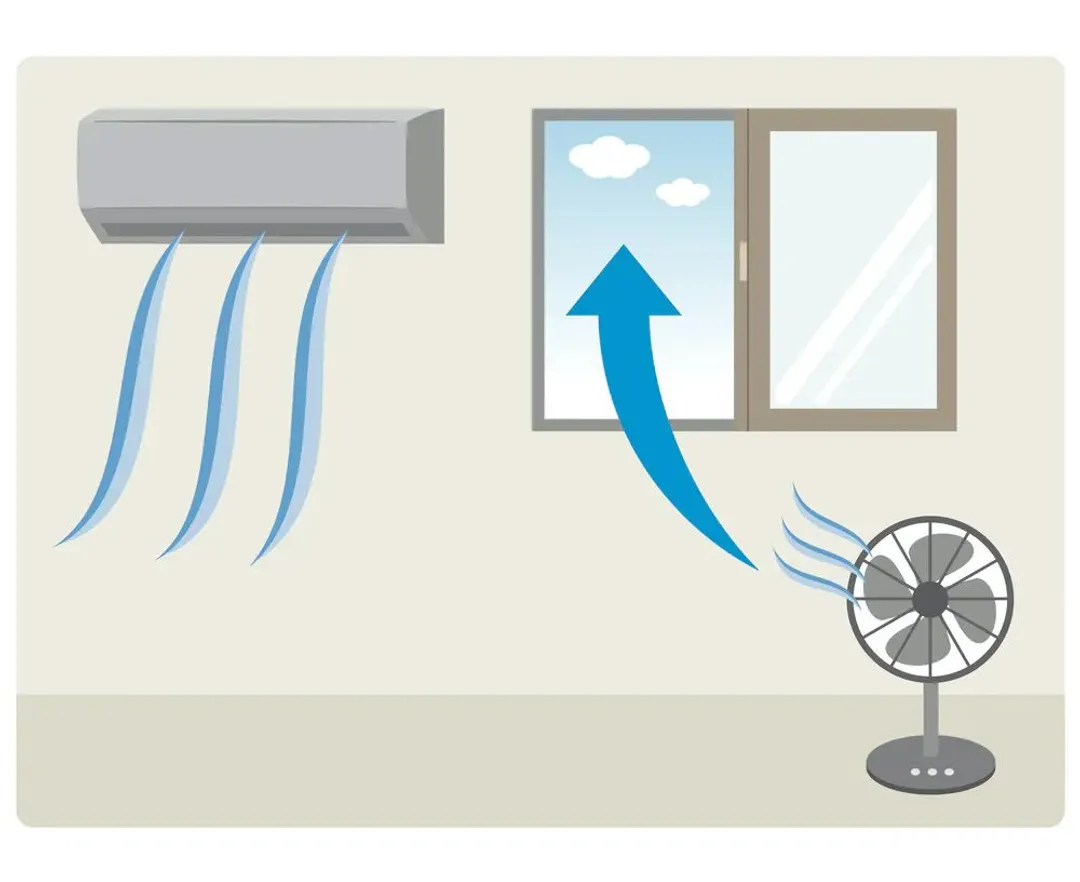
Whatever the case, you should also ensure proper ventilation so as to reduce the concentration of viruses and to prevent air contamination from the disinfectant. During the cleaning process, keep doors and windows open, use air filters, and turn on fans to help improve airflow.
Step 3: Wipe Dry the Surface
Grab a dry cloth and wipe down the entire surface. Make sure there isn’t any of the chemical liquid remaining on the surface as it could cause serious harm if exposed to your body, even in a small amount.
Step 4: Wash your Hands
We think this is the most important step to reduce the transmission of COVID-19 and to protect yourself against this dangerous virus. Although your hands do not touch the cleaning surface directly and may not look visibly dirty, you should not take any risks.
So, after disinfecting, immediately remove your gloves and wash your hands with soapy water for 20 seconds. For even deeper sanitizing, you can use a hand sanitizer with at least 60% alcohol.
Conclusion
So, now you’ve learned how to clean quartz countertops, which not only help your surface last longer, but also protect you and your beloved from getting sick. Just make sure to follow our recommendations, using suitable products and taking extreme precautions while cleaning.
Authors
Luna Regina is an accomplished writer and author who dedicates her career to empowering home cooks and making cooking effortless for everyone. She is the founder of HealthyKitchen101.com and HealthyRecipes101.com, where she works with her team to develop easy, nutritious recipes and help aspiring cooks choose the right kitchen appliances.

